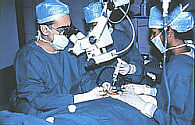| CAUSES OF MALE INFERTILITY |
A number of clinical conditions and disease entities can render a man infertile. The more important causes are summarised in the table.
| Causes of Male Infertility |
| 1. | Varicocele |
| 2. | Infections :
a. acute : smallpox, mumps, other viral infections
b. chronic : TB, leprosy, prostatitis |
| 3. | Sexually transmitted diseases |
| 4. | Idiopathic - cause unknown |
| 5. | Injury
a. direct : testicular or pelvic trauma, heat, irradiation
b. indirect : radiotherapy, chemotherapy, environmental toxins, drugs, marijuana, tobacco, alcohol |
| 6. | Undescended testes (cryptorchidism) |
| 7. | Previous surgery : inguinal, scrotal, retroperitoneal, bladder neck, vasectomy |
| 8. | Obstructions : congenital (aplasia), vasectomy, post-infective |
| 9. | Systemic illnesses esp. hepatic, renal |
| 10. | Immunologic : infection, obstruction |
| 11. | Ejaculatory disturbances |
| 12. | Spinal cord lesions |
| 13. | Genetic, endocrine & familial disorders : Klinefelter's syndrome, Young's syndrome, cystic fibrosis, adrenal hyperplasia |
| 14. | Sexual dysfunctions |
Sometimes, in spite of the most meticulous search, no obvious cause can be found for the infertility. This group, known as the idiopathic infertility group, constitutes a large percentage.
| EVALUATION OF MALE INFERTILITY |
The first test in the evaluation of the infertile male is the semen analysis. This test is inexpensive, easy to perform and gives valuable information.
A perfectly normal semen analysis report generally precludes a significant male factor component and investigation and treatment should be more appropriately targeted at the wife. In fact, in many countries, the first test in the evaluation of an infertile couple is the semen analysis. This is generally performed before any tests are conducted on the wife.
Often, in the case of male infertility, the semen analysis is abnormal. Either the count is low (oligospermia) or sperms are altogether absent in the ejaculate (azoospermia).
Sometimes, sperm motility is seriously affected (asthenospermia) and sometimes the sperms are totally immobile or dead (necrospermia). There are many other anomalies that one may find on semen analysis.
When one finds anomalies in the semen analysis, the next step is to try and find a cause for it. To do this, one must perform additional investigations. Some of the other tests that may need to be performed are a semen culture, anti-sperm antibody estimation, scrotal ultrasound, hormonal assays, karyotyping, vasography etc..
Treatment of male infertility is difficult and sometimes frustrating. Immediate results are hard to produce and persistence with therapy is required.
The following modalities of treatment are generally employed.
This consists of the administration of certain drugs to improve seminal quality. Clomiphene citrate, mesterolone, tamoxifen, gonadotropin injections, antibiotics, steroids etc. are commonly used.

Obstructions in the sperm conduction pathway, varicoceles, undescended testes etc. can be treated by operation.
Modern microsurgical techniques are of great help. Even patients who have undergone a vasectomy in the past can have their vasectomy reversed and the tubes recanalised successfully using microsurgery.
In many cases, neither medicines nor operations are of help. In such cases, an attempt is made in the reproductive laboratory to improve semen quality and facilitate the penetration of the sperm into the ovum. This includes sperm washing/capacitation, intra-uterine insemination (IUI), gamete intra-fallopian transfer (GIFT), in vitro fertilisation (IVF), and micro-manipulation (ICSI).
Microsurgery and assisted reproduction require considerable training, skill and infrastructure.
Despite the availability of so many treatment modalities, some patients remain incurable and no treatment, cheap or expensive, can improve their fertility prospects. One then has no alternative but to recommend an AID (donor insemination) or adoption.
Awareness of the magnitude and importance of the male factor in infertility is relatively recent. Tremendous advances have been made in andrological research over the past few years. If not today, one can envisage in the conceivable future, a situation where all males (and females) with infertility can be completely cured.
















 Obstructions in the sperm conduction pathway, varicoceles, undescended testes etc. can be treated by operation.
Obstructions in the sperm conduction pathway, varicoceles, undescended testes etc. can be treated by operation. 












